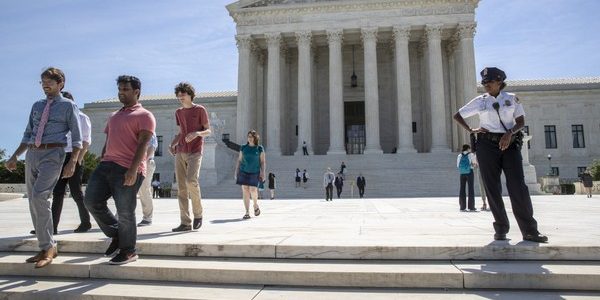An employee at the Oregon Department of Fish and Wildlife has won the first refund of mandatory union fees stemming from a U.S. Supreme Court ruling that public employees cannot be required to pay unions dues or fees if they opt out of membership.
Debora Nearman filed a lawsuit in April challenging the mandatory union costs as a condition of her employment at the agency. After the Janus decision was issued June 27, the Service Employees International Union Local 503 moved to settle the case and return more than two years of fees to Nearman, or $2,959.81.
Nearman, the wife of Oregon Rep. Mike Nearman, R-Independence, said the SEIU actively opposed her husband’s election efforts, forming a political action committee and spending some $53,000 to campaign against him, including distributing disparaging fliers.
Nearman also said she is a devout Catholic and strongly opposes SEIU’s position on abortion and its financial support of pro-choice political candidates and legislation. Finally, she said, SEIU takes policy positions that conflict with her political beliefs, including its support of a ballot measure that sought to impose a gross receipts tax on corporations. The SEIU spent millions lobbying in support of Measure 97, which was ultimately defeated.
The U.S. Supreme Court’s decision ended a provision in Oregon and 21 other states that required public employees to pay what’s known as “fair share” fees as a condition of their employment, even if they opted out of union membership. The fees are supposed to cover bargaining and contract administration, including handling grievances.
The plaintiff was Illinois public employee Mark Janus, who sued his union in 2015. He argued the union’s non-member fees still supported its political activities in violation of his First Amendment rights. Janus filed his case with legal aid from the Illinois-based Liberty Justice Center and the National Right to Work Legal Defense Foundation, the latter group said.
The decision’s impact has been hotly debated. Some maintain that it is likely to result in a significant loss of union membership and the fees that are used to bankroll candidates and union lobbying at the Capitol. Oregon still ranks among the top states in the nation for public employee membership.
“Nearman’s refund represents the first of what should ultimately be hundreds of millions of dollars or even more returned to public employees for union fees seized from them in violation of the First Amendment,” Mark Mix, president of the National Right to Work Foundation, said in a news release.
The National Right to Work Legal Defense Foundation is handling some 200 other cases across the country, including a class-action lawsuit in California by 30,000 state employees, Patrick Semmens, the group’s vice president, told the Associated Press.
If the 9th U.S. Circuit Court of Appeals rules in favor of the plaintiffs in the California case, they stand to be refunded more than $100 million, Semmens estimated.
Union advocates say public employees recognize the benefits of union membership and will continue to support them.
SEIU’s settlement with Nearman was explicit that the union has not admitting wrongdoing and was settling “for no other reason” than “to avoid the expense and inconvenience of further proceedings.”
Union officials said that meant it was not setting any precedent, and that it’s not liable to repay any fees paid before the Janus ruling.
“SEIU 503 is a strong union because we focus on our members’ priorities: bargaining strong contracts, funding critical government services, and lifting standards for all Oregonians,” Melissa Unger, executive director of SEIU Local 503 said in an emailed statement. “In order to keep that focus, we made the decision to settle this case rather than go through a costly and time-consuming legal battle.
“The national anti-union groups will try to make this about more than it is, but our members want us to keep our eyes on their priorities rather than engaging in protracted lawsuits.”
The Oregon branch of the SEIU claims 72,000 members who work in state, local government, nonprofit agencies and higher education. Its spokeswoman, Jill Bakken, told the Associated Press that the Supreme Court’s ruling that eliminated obligatory fees has led to a drop in membership “well within our expectations.”
“While we’re not sure what the long-term impacts will be yet — the case is still relatively new — we’re very encouraged,” Bakken said.







